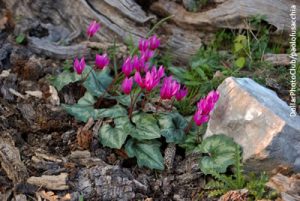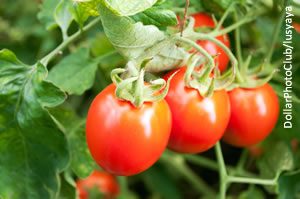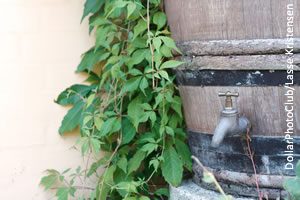“To see a world in a grain of sand and heaven in a wild flower…” So wrote the poet William Blake, suggesting that the tiniest portion of the world is a microcosm of the whole.
 While it may take a poet’s vision to see the world in a particle of rock, his point becomes much easier to understand when you consider your own backyard. Your yard may seem insignificant compared to the vastness of the planet, but your little scrap of real estate is an ecosystem in itself, in which all the major environmental issues of our day play themselves out on a miniature scale.
While it may take a poet’s vision to see the world in a particle of rock, his point becomes much easier to understand when you consider your own backyard. Your yard may seem insignificant compared to the vastness of the planet, but your little scrap of real estate is an ecosystem in itself, in which all the major environmental issues of our day play themselves out on a miniature scale.
Let’s take a look at three of the world’s biggest environmental issues — energy, air and water — at work in your back yard, along with some simple ways to improve them so you can enjoy a greener, cleaner backyard.
Greening Up Your Backyard Energy Use
What is the most energy-intensive backyard activity? For most of us, it’s mowing the lawn. Lawn mowers typically burn four times as much gasoline per hour as a car, according to the Texas Commission on Environmental Quality. Here are some tips for cutting emissions from your lawn:
- Replace your old lawn mower. If you have a small lawn, consider switching to a reel-type push mower. They do a surprisingly good job as long as you keep the blades sharp and mow regularly. You may also find that you enjoy mowing more when listening to the pleasant snick-snick of a reel mower rather than enduring the roar and fumes of a two-cycle gas mower.
If a non-motorized mower won’t work for you, there are all sorts of energy efficient and alternative fuel lawn mowers available on the market these days, including electric and natural gas mowers ranging from small machines to commercial lawn care equipment.
- Keep your mower engine tuned. Regardless of fuel type, a well-maintained mower will burn less to do the same job.
- Sharpen your mower blades. Sharp blades cut more easily through your lawn, which means your mower engine won’t have to burn as much energy to cut your grass.
- Consider going lawn-less. Replacing part or all of your grass with perennial plants or ground covers will not only slash
your backyard’s energy footprint; it can free up your time as well. Another option is to convert part of your backyard into a vegetable garden and enjoy delicious locally grown produce right from your yard.
Lighting is another big backyard energy sink for many homes. Switching to high-efficiency LED exterior garden and security lighting will help reduce your energy bill. Many solar-powered outdoor lighting models are also available.
Improving Your Backyard Air
Air quality is important for human and environmental health, and you may be surprised to learn that what you do in your backyard makes a real impact.
Here again, lawn mowers are a big factor, so consider making the switch to that human-powered or alternative fuel mower. Even if you decide to stick with gas, purchasing a newer mower manufactured since 2011 will ensure that your model complies with the latest EPA standards for air pollution from small engines.
Do you enjoy grilling or backyard campfires? Unfortunately, these are another source of backyard air pollution and may even put you at risk for cancer. You can reduce their impact by using natural charcoal on your grill and switching to a natural gas fire pit.
 Backyard Water Matters
Backyard Water Matters
Water scarcity is becoming an increasingly serious issue in North America. About 30 percent of the water American families consume is used for outdoor purposes, and much of this is wasted. Here are some ideas for reducing your backyard water use and protecting your outdoor water quality:
- Plant a rain garden. Instead of directing rainwater to the storm sewer, where it can contribute to flooding in times of heavy rain, install a garden in a low area of your yard. Rain gardens must be properly constructed to handle runoff, but once installed they need little maintenance and are pleasing to the eye. Some municipalities even offer rebates to offset the expense of planting them.
- Install a rain barrel. Using rainwater to irrigate your lawn and garden helps reduce runoff and is better for your lawn and garden than treated water.
- Recycle your water. Consider installing a graywater recovery system to reuse water from your shower or laundry for irrigation.
- Plant native landscaping. Native plants require little or no irrigation, because they are already adapted to the amount of rainfall you receive in your area. They also tend to thrive without a lot of care or chemical fertilizers or pesticides. In addition, native plants provide excellent wildlife habitat and are a haven for native birds, butterflies and beneficial insects.
- Mulch your garden. A thick layer of mulch will prevent your soil from drying out, so your garden will need less water.
- Let your grass grow longer. Longer blades means the grass can send its roots deeper, so it’s less reliant on regular watering. Three to four inches is a good length for a healthy lawn.
 The nice thing about “greening up” your backyard is that all these little actions can make a huge difference to the health and functioning of your backyard ecosystem — which in turn affects the greater environment, and most likely your own well-being, too. It’s not even hard to do. Just pick one project at a time. You will almost certainly find that your enjoyment and pride in your backyard increases the “greener” you make it!
The nice thing about “greening up” your backyard is that all these little actions can make a huge difference to the health and functioning of your backyard ecosystem — which in turn affects the greater environment, and most likely your own well-being, too. It’s not even hard to do. Just pick one project at a time. You will almost certainly find that your enjoyment and pride in your backyard increases the “greener” you make it!
Ryan McNeill is the president of Renewable Energy Corporation of Washington DC, one of the Mid-Atlantic’s largest residential solar energy companies.